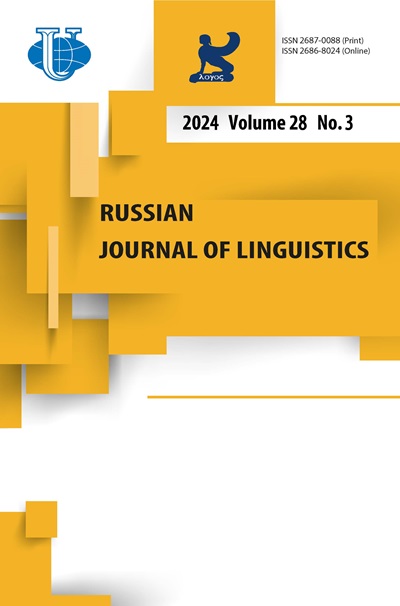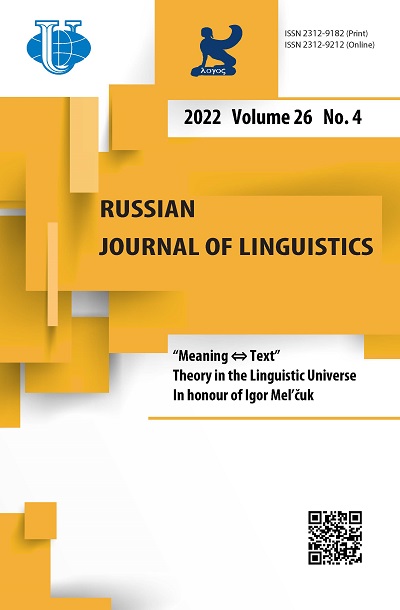Эмоции и отношения в современном русском языке через призму неологизмов: культурная семантика слова жесть и связанных с ним понятий
- Авторы: Гладкова А.1,2
-
Учреждения:
- Австралийский национальный университет
- Высшая школа экономики
- Выпуск: Том 26, № 4 (2022): Теория «Смысл ⇔ Текст» в лингвистической вселенной К юбилею И.А. МЕЛЬЧУКА
- Страницы: 970-994
- Раздел: Статьи
- URL: https://journals.rudn.ru/linguistics/article/view/32952
- DOI: https://doi.org/10.22363/2687-0088-32167
Цитировать
Полный текст
Аннотация
Современный русский лексикон подвержен стремительным изменениям, таким как заимствования, использование новых слов и выражений, а также появление новых значений у существующих словоформ. Новые значения являются проявлениями новых или усилением существующих культурных представлений. В статье рассматривается недавно возникшее разговорное употребление слова жесть (от первичного значения жесть как вида металла) и рост употребления слов жесткий и жестко как примеров «внутренних» языковых процессов. Слово жесть является разговорным словом и употребляется, в основном, в молодежном сленге, но также проникает в другие типы дискурса. В статье рассматриваются употребления слова жесть в качестве междометия, а также существительного в предикативных и атрибутивных функциях. Жесткий и жестко употребляются в политическом дискурсе как знаки власти. Цель статьи - проследить увеличение частотности анализируемых слов, изучить их семантику и установить связи между значением слов и культурными темами русского языка. Проведение данного лингвистического анализа с вниманием к культурным аспектам значения позволяет выделить культурно-значимые идеи в русском языке сегодня. Естественный семантический метаязык (ЕСМ) используется в качестве метода семантического анализа, языковые примеры взяты из Национального корпуса русского языка. На основе детального семантического анализа в статье предлагаются ЕСМ толкования слов жесть , жесткий и жестко , выявляется связь их значений с культурными темами «эмоциональность», «отсутствие контроля» и «откровенный разговор», и отмечается возросшая культурная значимость этих слов в современном русском языке. Исследование раскрывает тенденции использования современного русского языка, и его результаты могут быть применены в преподавании языка с углубленным изучением культуры и обучении межкультурной коммуникации.
Об авторах
Анна Гладкова
Австралийский национальный университет; Высшая школа экономики
Автор, ответственный за переписку.
Email: angladkova@gmail.com
ORCID iD: 0000-0002-4225-4805
получила степень PhD по лингвистике в Австралийском национальном университете, где является почетным лектором. Также она - профессор Высшей Школы Экономики (Нижний Новгород).
Канберра, Австралия; Нижний Новгород, РоссияСписок литературы
- Alba-Juez, Laura & Tatiana Larina. 2018. Language and emotion: Discourse-pragmatic perspectives. Russian Journal of Linguistics 22 (1). 9-37. https://doi.org/10.22363/2312-9182-2018-22-1-9-37
- Fasmer, Maks. 2004. Etimologicheskii slovar’ russkogo yazyka [Etymological Dictionary of Russian]. 4 vols. https://gufo.me/dict/vasmer (accessed 20 November 2022).
- Gladkova, Anna. 2010. Russkaya kul’turnaya semantika: emocii, cennosti, zhiznennye ustanovki [Russian cultural semantics: emotions, values and attitudes.] Moscow: Languages of Slavonic Cultures.
- Gladkova, Anna. 2017. Communication Modes, Russian. In Young Yun Kim (ed.), The International Encyclopedia of Intercultural Communication. Hoboken, NJ: Wiley. http://dx.doi.org/10.1002/9781118783665.ieicc0147
- Gladkova, Anna. 2020. When value words cross cultural borders: English tolerant vs. Russian tolerantnyi. In Bert Peeters & Kerry Mullan (eds.), Studies in Ethnopragmatics, Cultural Semantics and Intercultural Communication. Minimal English (and Beyond), 73-94. Singapore: Springer.
- Gladkova, Anna & Tatiana Larina. 2018a. Anna Wierzbicka, words and the world. Russian Journal of Linguistics 22 (3). 499-520. http://dx.doi.org/10.22363/2312-9182-2018-22-3-499-520
- Gladkova, Anna & Tatiana Larina. 2018b. Anna Wierzbicka, culture and text. Russian Journal of Linguistics 22 (4). 717-748. http://dx.doi.org/10.22363/2312-9182-2018-22-4-717-748
- Gladkova, Anna, Ulla Vanhatalo & Cliff Goddard. 2016. The semantics of interjections: An experimental study with Natural Semantic Metalanguage. Applied Psycholinguistics 37 (4). 841-865. http://dx.doi.org/10.1017/S0142716415000260
- Goddard, Cliff. 2006. Ethnopragmatics: A new paradigm. In Cliff Goddard (ed.), Ethnopragmatics: Understanding discourse in cultural context, 1-30. Berlin: Mouton de Gruyter.
- Goddard, Cliff (ed.) 2006. Ethnopragmatics: Understanding Discourse in Cultural Context. Berlin: Mouton de Gruyter.
- Goddard, Cliff. 2014. Interjections and emotion (with special reference to “surprise” and “disgust”). Emotion Review 6. 53-63.
- Goddard, Cliff. 2015. “Swear words” and “curse words” in Australian (and American) English. At the crossroads of pragmatics, semantics and sociolinguistics. Intercultural Pragmatics 12 (2). 189-218.
- Goddard, Cliff. 2018. Ten Lectures on Natural Semantic MetaLanguage: Exploring Language, Thought and Culture Using Simple, Translatable Words. Leiden: Brill.
- Goddard, Cliff & Anna Wierzbicka (eds.). 2002. Meaning and Universal Grammar: Theory and Empirical Findings. 2 Vols. Amsterdam: John Benjamins.
- Goddard, Cliff & Anna Wierzbicka. 2014. Words and Meanings: Lexical Semantics across Domains, Languages and Cultures. Oxford: Oxford University Press.
- Google Books Ngram Viewer https://books.google.com/ngrams/ (accessed 15 September 2022).
- Humboldt, Wilhelm von. 1971[1836]. Linguistic Variability and Intellectual Development. Coral Gables, Florida: University of Miami Press.
- Humboldt, Wilhelm von. 1988[1836]. On Language: The Diversity of Human Language-Structure and its Influence on the Mental Development of Mankind. Cambridge: Cambridge University Press.
- Humboldt, Wilhelm von. 1997. Essays on Language. In Theo Harden & Daniel Farrelly (eds.). Frankfurt am Main: Peter Lang.
- Krongauz, Maksim. 2008. Russkii yazyk na grani nervnogo sryva [The Russian language at the edge of a nervous breakdown]. Moscow: Yazyki slavyanskoi kul’tury.
- Krongauz, Maksim. 2013. Samouchitel’ Olbanskogo [Teach yourself Olbanian]. Moscow: ACT.
- Krylov, Grigory A. 2005. Etimologicheskii slovar’ russkogo yazyka [Etymological Dictionary of Russian]. https://gufo.me/dict/krylov (accessed 19 November 2022).
- Krysin, Leonid P. (ed.). 2014. Tolkovyi slovar’ russkoii razgovornoi rechi [Explanatory Dictionary of the Russian colloquial speech]. Vol. 1 А-И. Moscow: Yazyki slavyanskoi kul’tury.
- Larina, Tatiana, Vladimir Ozyumenko & Svetlana Kurtesh. 2020. Deconstructing the linguacultural underpinnings of tolerance: Anglo-Slavonic perspectives. Lodz Papers in Pragmatics 16 (2). 203-234. Special issue on (In)tolerance and (in)civility in public discourse from multidisciplinary perspectives https://doi.org/10.1515/lpp-2020-0010
- Lerner, Julia & Michele Rivkin-Fish. 2021. On emotionalisation of public domains. Emotions and Society 3 (1). 1-11. https://doi.org/10.1332/263169021X16149420145743
- Lerner, Julia & Claudia Zbenovich. 2013. Adapting the Therapeutic Discourse to Post-Soviet Media Culture: The case of Modnyj Prigovor. Slavic Review 72 (4). 828-849.
- Levontina, Irina. 2015. O chem rech’? [What is it about?] Moscow: Corpus.
- Levontina, Irina. 2016. Russkii so slovarem [Russian with a dictionary]. Moscow: Corpus.
- Levisen, Carsten. 2012. Cultural Semantics and Social Cognition. A case study of the Danish universe of meaning. Berlin: Mouton de Gruyter.
- Levisen, Carsten & Sophia Waters. 2017. How words do things with people. In Carsten Levisen & Sophia Waters (eds.), Cultural Keywords in Discourse, 1-23. Amsterdam: John Benjamins Publishing Company.
- Mel’čuk, Igor. 2012. Semantics: From Meaning to Text. Amsterdam: John Benjamins.
- Mel’čuk, Igor A. 2018. Anna Wierzbicka, Semantic decomposition, and the Meaning-Text approach. Russian Journal of Linguistics 22 (3). 521-538. http://dx.doi.org/10.22363/2312-9182-2018-22-3-521-538
- Ozyumenko, Vladimir & Tatiana Larina. 2018. Understanding Social Values and Attitudes through Cultural Semantics: Tolerance vs. tolerantnost’. INTCESS18 Proceedings. 5th International conference on education and social sciences, 5-7 February, 2018, Istanbul, Turkey, 589-595.
- Ozyumenko, Vladimir & Tatiana Larina. 2021. Threat and fear: Pragmatic purposes of emotionalisation in media discourse. Russian Journal of Linguistics 25 (3). 746-766. https://doi.org/10.22363/2687-0088-2021-25-3-746-766
- Peeters, Bert 2015. Tall poppies in the land down under: An applied ethnolinguistic approach. International Journal of Language and Culture 2 (2). 219-243. http://dx.doi.org/10.1075/ijolc.2.2.04pee
- Richmond, Yale. 2009. From nyet to da: Understanding the new Russians (4th ed.). Boston, MA: Intercultural Press.
- Russian National Corpus. https://ruscorpora.ru/ (accessed 15 September 2022).
- Sapir, Edward. 1949. Selected Writings of Edward Sapir in Language, Culture and Personality. In David Mandelbaum (ed.). Berkeley: University of California Press.
- Whorf, Benjamin. 1956. Language, Thought and Reality: Selected Writings of Benjamin Lee Whorf. In Carroll J. (ed). Massachusetts: The M.I.T. Press.
- Wierzbicka, Anna. 1992. The semantics of interjection. Journal of Pragmatics 18. 159-192.
- Wierzbicka, Anna. 1996. Semantics: Primes and Universals. Oxford: Oxford University Press.
- Wierzbicka, Anna. 1997. Understanding Cultures through their Key Words: English, Russian, Polish, German, and Japanese. Oxford: Oxford University Press.
- Wierzbicka, Anna. 2021. “Semantic Primitives”, fifty years later. Russian Journal of Linguistics 25 (2). 317-342. http://dx.doi.org/10.22363/2687-0088-2021-25-2-317-342
- Zalizniak, Anna, Irina Levontina & Alexey Shmelev. 2005. Kluchevye idei russkoi yazykovoi kartiny mira [Key ideas of the Russian linguistic picture of the world]. Moskva: Yazyki slavyanskoi kul’tury.
- Zappettini, Franco, Douglas M. Ponton & Tatiana V. Larina. 2021. Emotionalisation of contemporary media discourse: A research agenda. Russian Journal of Linguistics 25 (3). 586-610. https://doi.org/10.22363/2687-0088-2021-25-3-586-610

















